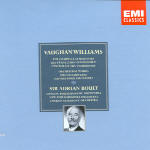Adrian Boult was closely associated with Ralph Vaughan Williams’ music, recording most of his major works, including Job four times and the complete symphonies twice. So this budget 8-disc box has “authoritative” written all over it. Unfortunately, “authoritative” does not mean “definitive”. The works here were recorded between 1967 and 1975, when Boult was in his late 70s and early 80s and ripe wisdom was often matched by flagging energy. That loss of vitality is reflected in scherzo movements that lack bite and allegros that lack tension. But Boult shapes VW’s trademark grand themes with warmth, understanding, and a “rightness” of phrasing. Slow movements are moving, even when they’re sometimes more expansive than is good for them. Standing alone, each piece affords enjoyment and sometimes, as in the Fifth and Pastorale Symphonies and the shorter incidental works, a good deal more than that. But Boult’s earlier monophonic recordings of the symphonies for Decca offer more vigorous, tighter conducting that makes the best case for VW as a great symphonic composer.
His nine symphonies, each with its own distinct personality, include several of the century’s finest. The London and the Pastorale are gentle delights. The visionary middle group–4, 5, and 6–are masterpieces and required listening, the Seventh (Sinfonia antartica) is one of the most chilling and inspiring of the set, the percussion festival of the Eighth is terrific, and the enigmatic Ninth, like Shostakovitch’s 15th, nourishes even as it puzzles. Then there’s Job, worthy of standing alongside Prokofiev’s ballets. Of course, no integral set gets everything right and VW admirers will want individual works led by Previn, Haitink, Bakel, and others including Boult himself on Everest (Job and the Ninth Symphony), as well as Mitropoulos’ Fourth Symphony and VW’s own blistering wartime recording of the Fourth.
This set is an attractive proposition. Performances are never less than good; the sound is fine, if not as impactful as the original EMI LPs (which were audiophile favorites), and VW’s works teem with subtleties that demand multiple interpretations. So this gets a recommendation as a cost-effective, space-saving way to get to know these fine works or to supplement other versions in your collection. If you do get this though, be aware that the booklet listing of the contents of disc 7 is wrong. Instead of the six tracks listed, there are eight and the order of the works is as follows: track 1 is the Serenade to Music, tracks 2, 3, and 4 are the three components of the English Folk Song Suite, track 5 is Norfolk Rhapsody No. 1, track 6 is Greensleeves, 7 is In the Fen Country, and 8 is The Lark Ascending. [12/26/2000]
































